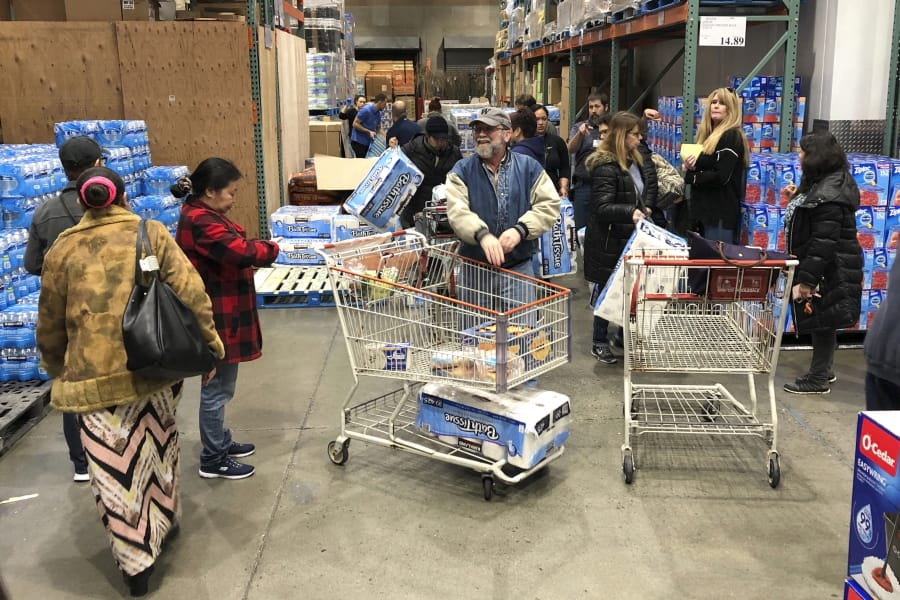9:28 a.m.
On a Thursday.
Costco, Vancouver.
A crowd of approximately 200 people gathered outside the building in the minutes leading up to opening time, split into three lines that snaked around the shopping cart storage area and converged in front of the entrance.
Some of the shoppers said they don’t typically visit Costco on weekday mornings, so they didn’t have a sense of whether the huge line was a usual sight. But regular Costco shoppers in the line offered a clear assessment: This is not normal.
Shoppers began to exit the store about 10 minutes after it opened. The majority of them were pushing carts that included at least one 48-pack of toilet paper — sometimes as many as three or four. Bottled water and paper towels were also frequent sights.
As they returned to their cars, customers described the scene inside. Most said they had rushed to the back of the store to seek out a fresh shipment of toilet paper piled high on several pallets. It didn’t last long.
“By the time I got back there, they were down to one pallet of toilet paper,” said one shopper who emerged at about 10 a.m. “I didn’t even try to look for hand sanitizer. I figured that was a lost cause.”
Another shopper said he had arrived the previous night to find the toilet paper section emptied; he had been told to come back first thing in the morning to have a shot.
This routine has become a regular event at the Vancouver Costco in the past couple of weeks, according the shoppers, as thousands of local residents try to stock up on supplies in case the ongoing outbreak of COVID-19 pushes them into a home quarantine.
It’s not just Costco, either. A similar pattern has been playing out across most major grocery stores, both nationally and in Clark County. In recent weeks, shoppers at the Grand Central Fred Meyer in Vancouver have at times encountered near-empty shelves where toilet paper and Clorox wipes can usually be found, with posted signs indicating that customers will be limited to five items per person to conserve supplies.
Other public businesses
Grocery stores have been among the most visibly impacted so far, but there are numerous other public-facing businesses that have had to adopt new practices and begin asking themselves tough questions about how they’ll respond if the outbreak worsens.
Social distancing measures, such as ordering employees to work from home, can be relatively straightforward for businesses with mostly white collar workforces. But a large segment of businesses are built around serving customers on-site, with everyone in one place.
Manufacturing plants, restaurants and other retail and entertainment destinations in Clark County are working to develop response strategies while continuing their regular operations. The Columbian reached out to several local businesses from multiple industries to learn about their plans.
The responses varied by industry, but there are some common steps that all of the businesses are taking such as monitoring guidance from the Centers for Disease Control and Prevention and urging employees to stay home if they get sick.
The biggest change across all industries is a push to frequently clean and sanitize “high-touch” surfaces. At Vancouver Mall, for example, that means play areas, door handles, escalator handles, restrooms and food court tables, according to mall general manager Tracy Peters.
So far, Clark County has seen only one confirmed case of COVID-19, but local companies want to be ready if that number rises.
“What we’re trying to do is not panic, but be proactive,” said Pat McDonnell, vice president of operations at SEH America, the Vancouver-based silicon wafer manufacturer and subsidiary of the Japanese company Shin-Etsu Handotai.
Manufacturing
SEH America doesn’t have hundreds of customers visiting every day, but it does have hundreds of employees on its manufacturing floor — and McDonnell said it’s critical that the employees stay healthy so the full plant can keep running.
“If you have one of our areas shut down, it shuts the whole plant down, almost,” he said.
The company has always maintained strict security and sanitation practices, but they’ve been enhanced in recent weeks. Vendor and contractor visits have been cut down to an absolute minimum, he said, as have most business trips for SEH’s own employees.
The company has increased the number of its internal sanitation stations to at least 35, giving employees places to get hand sanitizer and wipes. Workstation computers throughout the factory are routinely sanitized.
Meetings are being held in large rooms, McDonnell said, and handshakes are discouraged. SEH is also considering splitting some of its shifts into “A and B” segments with staggered schedules, he said, although that idea is still just a possibility at this point.
The company is urging any employees who develop a fever to stay home and call in to report their symptoms. Employees who get sick and recover will have to pass a temperature check at the front gate before they can be allowed back in.
At industrial laser manufacturer nLIGHT, CEO Scott Keeney said the company went through an initial round of coronavirus impacts back in January at its Shanghai facility. The big takeaway from that experience, he said, was that social distancing works — none of the factory staff got sick and there were very few COVID-19 cases reported in the surrounding community.
Keeney said he’s implementing similar policies at nLIGHT’s Vancouver headquarters, telling staff to work from home whenever possible and taking steps to minimize in-person interactions among employees who do need to come in.
ilani
At ilani, visitor traffic has remained high and the casino is operating normally, according to president and general manager Kara Fox-LaRose.
Some of the casino’s standard procedures will help avoid contamination, such as frequent replacement of dice and cards. All cards are replaced at least every 24 hours, she said, and some games use single-use-only cards — or call for the cards to be exchanged every few hours.
Slot machines are the other big area of concern, and Fox-LaRose said ilani has responded by stepping up its cleaning procedures. All high-touch surfaces are sanitized multiple times per day with disposable wipes, and the casino has installed more hand sanitizer stations both on the gaming floor and in back areas.
The casino’s modern HVAC system is also designed to use 100 percent outside air, she noted, decreasing the risk of a virus recirculating.
“We are always committed to operating a safe and well-maintained environment, and we will continue to watch for new information and guidance from public health authorities and adjust our approach as needed,” Fox-LaRose said in an email.
New Athlete
New Athlete owner Ryan Paul said the training gym hasn’t seen any major change in customer traffic. As a matter of general procedure, the gym staff encourages guests to wipe down the equipment after each use, he said, but the gym took the extra step earlier this week of bleaching all the equipment surfaces.
If Clark County sees a substantial outbreak, Paul said, the gym would switch to a remote training system where the staff would write training programs for athletes to follow at home.
“If it’s a couple weeks, training programs are easy to do,” he said.
As a gym owner, Paul said he’s more concerned about the long-term economic damage of a widespread pandemic, because people tend to try to conserve their disposable income and cut down on expenses during recessions — and gym memberships can often be one of the things people give up.
New Athlete is a specialized gym with a core client base of athletes, Paul said, and those clients will likely stick around because fitness is a key part of their professional lives. But the gym also serves college and high school athletes, he said, which presents more of a vulnerability.
“If mom and dad for whatever reason lose their jobs, the gym membership will go,” he said.
But for the time being, he said, customer traffic numbers are still strong, and the gym is still signing up new members.
Burgerville
Vancouver-based restaurant chain Burgerville has responded to the outbreak by stepping up its cleaning procedures at all of its stores, most of which are located in the Portland metro area. The company has also been reminding workers to stay home if they don’t feel well.
“Right now we believe that everyone at Burgerville is healthy, and our goal is to keep it that way,” said Burgerville director of strategic initiatives Hillary Barbour.
The enhanced procedures include frequent cleaning of high-touch surfaces, making more hand sanitizer available and instructing employees to change to fresh gloves more frequently when handling food.
The company has been reaching out to its suppliers to try to avoid any disruptions, and Barbour said Burgerville’s local supply chain will likely help it stay on top of things.
“We anticipate much less disruption to our supply chain than some other retail might see,” she said.
It’s too soon to know how the outbreak is impacting customer habits and traffic patterns, she said, but one trend the company is expecting to see is a sharp spike in the number of delivery orders if customers begin to self-quarantine at home or avoid public locations. Burgerville has been working with delivery partner service DoorDash to prepare for that shift, Barbour said.
Burgerville is also discussing longer-term contingency plans, she said, such as a switch to drive-thru or delivery-only service and operating some locations on limited hours. There’s currently no reason to implement any such measures, Barbour stressed, but the company routinely develops response plans for disruptive scenarios as a precaution.
“This (coronavirus) situation itself is unique for us,” she said, “but contingency and scenario planning is not.”




